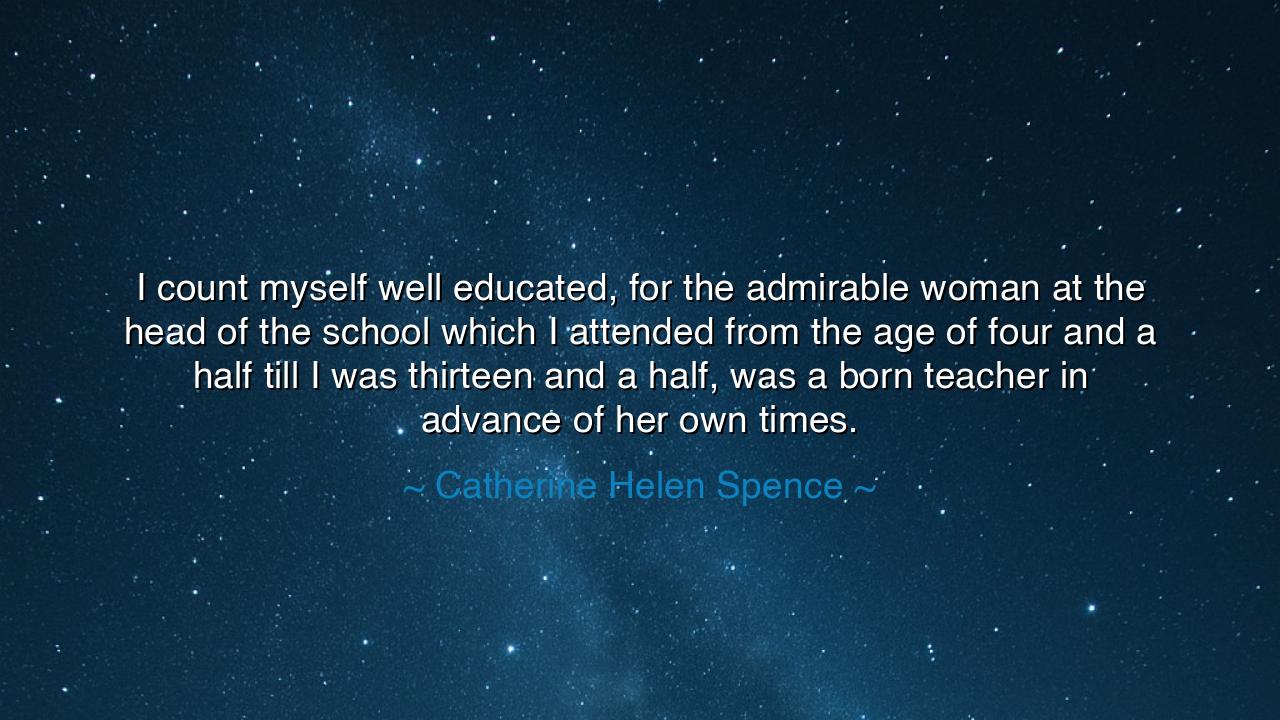
I count myself well educated, for the admirable woman at the
I count myself well educated, for the admirable woman at the head of the school which I attended from the age of four and a half till I was thirteen and a half, was a born teacher in advance of her own times.






Catherine Helen Spence once wrote: “I count myself well educated, for the admirable woman at the head of the school which I attended from the age of four and a half till I was thirteen and a half, was a born teacher in advance of her own times.” In this remembrance, Spence offers not only gratitude but a vision of what true education means. It is not the piling up of facts, nor the strictness of rote memorization, but the presence of a soul aflame with purpose—a teacher whose wisdom flows beyond the boundaries of her age, shaping the minds and spirits of those entrusted to her care.
The origin of this truth lies in Spence’s own extraordinary life. Born in Scotland and raised in Australia, she became a pioneer in literature, journalism, social reform, and even politics. She was the first female political candidate in Australia, and a tireless advocate for women’s rights and electoral reform. Yet when she looked back upon the roots of her greatness, she did not claim them as her own alone. She traced them to the influence of that “admirable woman” who guided her youth, a teacher whose foresight and courage gave her the foundation upon which she would build her public life. Thus, her education was not merely an accumulation of lessons, but a transmission of character, imagination, and vision.
The ancients, too, revered the transformative power of such mentors. Aristotle himself, though a philosopher of towering intellect, always acknowledged Plato as the one who opened his path to wisdom. Alexander the Great, conqueror of empires, owed his vision of the world to the early teachings of that same philosopher. History again and again affirms Spence’s insight: that to be “well educated” is not to be filled with knowledge alone, but to be guided by a teacher who awakens the mind to possibilities that the age itself has not yet embraced.
We see this lesson in more recent times as well. Consider Anne Sullivan, the devoted teacher of Helen Keller. With patience, brilliance, and love, she reached into a world of silence and darkness, and drew forth a voice that would speak to the entire world. Keller herself, like Spence, counted her education not merely in books or lectures, but in the presence of a guide “in advance of her own times.” Without Sullivan, Keller’s genius might have remained hidden; with her, it shone as a beacon to millions.
Spence’s words also remind us that greatness often comes through the overlooked. The teacher, whose work is often confined to the walls of a modest school, holds in her hands the shaping of future leaders, reformers, and visionaries. The world may not always honor her name, but her influence echoes through generations. To say “I count myself well educated” is, in truth, to say, “I was blessed with a teacher who believed in me before the world did.” This is the inheritance of all true students—the unseen gift of belief, discipline, and vision.
The lesson, then, is clear: honor your teachers, and recognize the weight of their influence. Seek out those who do not merely repeat what is known, but who dare to teach “in advance of their own times.” If you yourself are called to teach, understand the immensity of your task—you are not only conveying knowledge, but building character, awakening dreams, and shaping the very destiny of your pupils. Your influence may stretch far beyond what you will ever see.
Practically, let each person cultivate gratitude toward those who formed them. Remember the early voices who gave you courage, and in turn, strive to be such a voice for others. Parents, guide your children with both wisdom and vision. Citizens, uplift and defend those who devote themselves to education. And all of us, whether formally teachers or not, must remember that to inspire another is the noblest work we can do.
Thus Catherine Helen Spence’s words shine as both testimony and command: “I count myself well educated, for the admirable woman … was a born teacher in advance of her own times.” May we learn from this to revere those who guide the young, to strive ourselves to guide wisely, and to remember that the true measure of education is not in the lessons of yesterday, but in the vision it awakens for the future.






AAdministratorAdministrator
Welcome, honored guests. Please leave a comment, we will respond soon